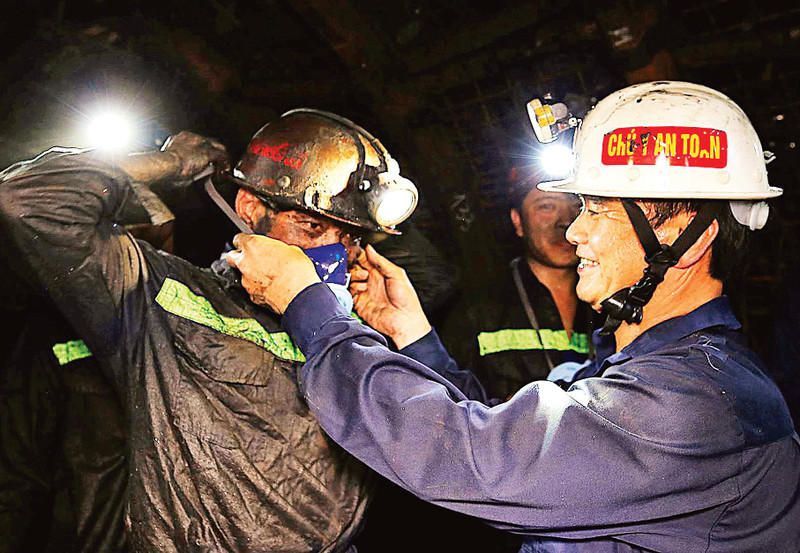The test of talent and morality
The COVID-19 pandemic was a test. It was also an opportunity for Vietnamese enterprises to demonstrate their role in the face of significant social challenges. During the early years of the resistance war against the French colonialists, the nationalist capitalist Trinh Van Bo donated over 5,000 taels of gold to the provisional revolutionary government, equivalent to nearly double the funds in the state treasury, and in the past two years, Vietnamese entrepreneurs also donated tens of trillions of Vietnamese dong to help combat COVID-19.
Their assistance comes in form of contributions to the vaccine fund, rice donations to the urban poor, huge financial donations to procure medical equipment and small allowances to help those in need. Or it can simply be the effort to ensure their employees would receive wages while their enterprises themselves were struggling.
Humanity is caring for the people. Humane enterprises usually place people at the centre stage and take the task of relieving pains and meeting people’s needs as their development orientation. Therefore, humanity in entrepreneurs and their enterprises is the attention to addressing human concerns within society. In small businesses, the beneficiaries can be employees and their families. Larger businesses may pay attention to a locality or an entire country. An enterprise with a greater vision will care about the interests of all mankind.
Naturally, the first thing a newly-established business will think of at the beginning of its operation is how to survive, sell goods and earn profit. But after a certain period, the mission of enterprises will no longer be framed in their interests, but they look forward to creating values for their country and fellow countrymen. A president of a private multi-industry corporation once told me that now is the time to think about doing something good for the country and society. I trusted his words because I have witnessed the positive changes in the service philosophy of many entrepreneurs who grew up from innovations.
In the moments of life and death, when more than 100 stores were almost “frozen” following the blockade policy in response to the COVID pandemic, thus generating no revenue, a CEO of a fashion and home-goods company was still determined to ensure monthly income for thousands of its employees and none had to quit their jobs. Special attention was also made to care for the spiritual lives of the employees. The CEO told the management board that even if the pandemic is prolonged, they still have to create a humane and kind environment for their workers and employees. It is no coincidence that the Vietnam Chamber of Commerce and Industry (VCCI) has set humanity and business ethics as the criteria for this year's Outstanding Entrepreneurs Award. VCCI President Pham Tan Cong said that the award winners must have both talent and morality.
Creating real fairness
The role of businesses and entrepreneurs has been increasingly recognised in society. Vietnam’s national position has been significantly enhanced in recent years, thanks to the stability of the economy, in which the businesses’ contributions are very important. On May 26, 2022, credit rating agency S&P Global Ratings upgraded Vietnam’s long-term sovereign credit rating to BB+, outlook Stable. Previously, Fitch Ratings and Moody's also gave similar assessments. Vietnam's GDP in 2022 is expected to reach about 391.92 billion USD and is forecasted to be about 424.45 billion USD in 2023, ranking 42nd out of 177 economies according to the World Bank. The above achievements were primarily thanks to the contributions from thousands of Vietnamese businesses.
During the really difficult times with great challenges for society and people, most Vietnamese entrepreneurs were ready to voluntarily join hands to overcome difficulties and address the urgent needs of the people in many ways. The devastating flash floods in 2020 in the central region were an example demonstrating the spirit of humanistic mutual assistance of enterprises across the country.
Of course, not all businesses choose the path to pursue humanity. There are still many businessmen who only pay attention to their interests or their enterprises, higher than the interests of the community. They are willing to make profits based on the common difficulties of society. People like the General Director of Viet A Company Phan Quoc Viet, the General Director of Tan Hoang Minh Group Do Anh Dung, Trinh Van Quyet from FLC Group and Trinh Xuan Thanh from PVC Group are not uncommon. However, they are still a minority in the community of entrepreneurs who are both talented in developing their businesses and choosing the mission of improving people's lives and contributing to the general prosperity of the whole society.
The chairman of an agricultural corporation said that his company only invests in clean, high-quality and safe products. "I only sell what my family can eat," he declared.
However, entrepreneurs are still not the object that is cared for and is facilitated to best promote their capacity and contribution. Policies, even in the most difficult times, are less focused on the interests of entrepreneurs and businesses.
During the stressful period of the COVID-19 pandemic, entrepreneurs have to both contribute to society through anti-epidemic activities, take care of the lives of their officials and employees, and ensure to pay taxes and insurance as required. Most of them do not receive many incentives.
On holidays, especially Lunar New Year (Tet), employees' rights to rest are of such concern that many ministries and branches participate in planning and debating how many days to take leave, but very few people care how it affects the efficiency of the performance of businesses. The management mechanism is still a loophole to facilitate relationships, not creating fairness for competition in a professional capacity.
Every year, we have a day for entrepreneurs, while the world does not have such a day. That is showing more concern for the class that is making an important contribution to creating direct benefits for society. But there is still a lot of work to be done, to create real equity among the components of the structure of the economy.
















